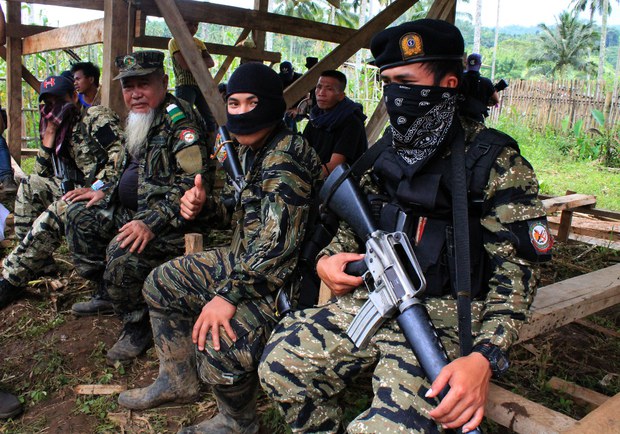Philippine President Likely to Sign Muslim Autonomy Law Next Week
2018.07.19
Cotabato and Davao, Philippines
 Calandada Domalondong (with beard), a commander of the Moro Islamic Liberation Front, is seen with MILF fighters at Camp Bilal II Base Command, in the remote hinterland town of Tangkal, in the southern Philippine province of Lanao del Norte, May 28, 2018.
Calandada Domalondong (with beard), a commander of the Moro Islamic Liberation Front, is seen with MILF fighters at Camp Bilal II Base Command, in the remote hinterland town of Tangkal, in the southern Philippine province of Lanao del Norte, May 28, 2018.
Philippine President Rodrigo Duterte is expected to sign a law giving expanded autonomy to minority Muslims in the country’s restive south when he delivers his annual address to Congress next week, officials said Thursday.
Lawmakers led by Senate Majority Leader Juan Miguel Zubiri and House Majority Leader Rodolfo Fariñas, who were part of a 28-member bicameral committee, agreed on Tuesday night to a consolidated version of the bill following intense deliberations.
The bill, originally called the Bangsamoro Basic Law (BBL), was renamed the Organic Law for the Bangsamoro Autonomous Region in Muslim Mindanao (BARMM) or the Bangsamoro Organic Law.
It is likely to be signed on Monday by Duterte, who is scheduled then to deliver his second annual State of the Nation Address before a joint session of Congress, according to his spokesman, Harry Roque.
Ghadzali Jaafar, vice chairman of the Moro Islamic Liberation Front (MILF), said it was fully satisfied with the content of the law, which aims to lay a foundation for self-governance and resolve a decades-old insurgency in the mineral-rich, but largely impoverished south.
“We thank lawmakers for respecting our concerns,” Jaafar said. “We agree with this 100 percent.”
Senator Zubiri said he would transmit the proposed law to Duterte for review and signing as a centerpiece of his report to Congress.
The law would then be ratified through a plebiscite in November, which would then be followed by the president’s appointment of members of the Bangsamoro Transition Authority by either December or January next year.
Sen. Paolo Benigno “Bam” Aquino said the passage of law was a big step toward attaining peace in the southern region, where hundreds of thousands of citizens have been displaced or killed in fighting during the past half century.
“Now we need to unite to make sure people will benefit from the law. Let’s keep an eye that these historic reforms will help bring peace and development to our Muslim brothers,” Aquino said in a statement.
Basic governance
But Senate minority leader Franklin Drilon said that while the proposed law may bring peace to Mindanao, its chances of succeeding when it came to promoting the basic issues of good governance was likely nil.
“I am not optimistic that the BBL will result in good governance. The failure of governance in the ARMM, not only the decades-long conflict, is also to be blamed for the high incidence of poverty in the region,” Drilon said.
He was referring to the Autonomous Region in Muslim Mindanao, which was a precursor of the Muslim body envisioned to be covered by the self-rule area offered to the MILF.
The previous government of President Benigno Aquino, which signed the peace pact with the MILF in 2014, had described the ARMM region as a “failure.”
Drilon stressed that the law passed by the bicameral conference committee appeared to have been watered down and “lacked teeth” in referring to “the prevailing politics and governance” in the region, which remains one of the poorest in the region despite millions of dollars poured into it.
He said that the joint body had struck down his proposed “anti-dynasty provision.” The provision would have outlawed large Muslim families from cornering a major chunk of the wealth and politics in the region.
“Unfortunately, the future of the Bangsamoro region will be in the hands of very few families again, because of our failure to prevent political dynasty,” Drilon said.
The proposed law to be signed by Duterte apparently contained watered down provisions, according to Muslim rights groups, including the powers to concerning regulatory powers concerning the rights of indigenous groups and those concerning land, water and public utilities management.
In 2014, the 12,000-strong MILF dropped its bid for self-rule to settle for an expanded autonomy when it signed the peace deal with Manila.
The rebel group settled for the creation of the Bangsamoro Basic Law, the basic structure that would give the MILF expanded autonomy.
But after the deal was struck four years ago, the proposed law never made it through the congress dominated largely by Christian lawmakers, fearful that giving the MILF autonomy and power could lead to trouble.
Richel V. Umel in Iligan City, Philippines contributed to this report.







